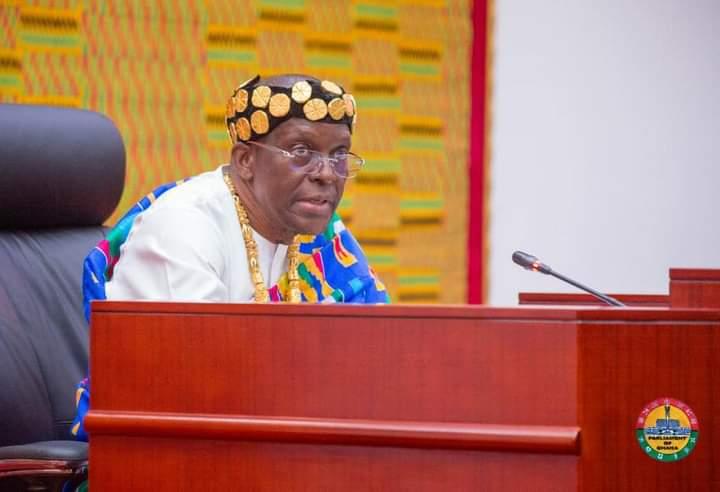

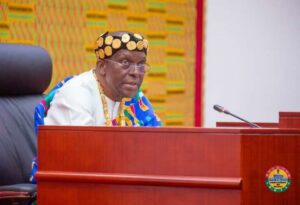
When Speaker Alban Bagbin recently walked into the chamber of parliament to preside over the business for the day, he also had a lot on his mind beyond the agenda for the day.
He was about to crack the whip and rein in errant members of parliament (MPs) and stop them from all lawless pursuit of bread and butter activities in order to uphold the dignity of the House.
He told the MPs there would be dire consequences for any MP found to be engaged in lawless profiteering outside of their fulltime jobs as legislators without authorisation by the speaker.
According to him, “this trend, if left unchecked, risks eroding the ethical standards of public service, weakening parliamentary oversight, and compromising the credibility of parliament in the eyes of the public.”
He explained that the time has come to give effect to the rules, affirm the institutional safeguards, and take the necessary steps to restore full compliance with both the letter and spirit of the constitution, as captured in Article 98 of the constitution, which is a constitutional imperative.
Mr. Bagbin said these on June 10, 2025, when the house convened around 14 hours to execute the business of the day as captured in the order paper. The line-up of business for the day was a normal one. Prayers, roll call, recital of the national pledge, messages from the president, correction of votes and proceedings and official report, statements, presentation of papers and motions among others. However, added to this line-up of the day’s business was an item included as “formal communication by the speaker.”
This formal communication, it seems, was to bring back MPs to the path of “righteousness” and fidelity to their official duties as legislators.
Sadly enough, at the time Speaker Bagbin was delivering his statement, and as important as this statement was, the number of MPs present in the chamber was a handful. Despite the fact that the house was sitting after 14 hours and committee meetings had been scheduled for the morning around 11.00 hours just to make time for MPs to be in the chamber for the plenary session that afternoon.
On the plus side, however, was that leaders for both the NDC and NPP sides were fully represented with majority leader, Mahama Ayariga and minority leader, Kwamena Afenyo-Markin present to hear and to respond to the speaker’s statement after it was delivered.
Mr. Bagbin did not mince words when he made his official statement. He expressed the views that the unlawful pursuit of profits and positions by MPs outside of their parliamentary duties was interfering with the discharge of their work, and was creating a conflict of interest situation, weakening parliamentary oversight and compromising the credibility of parliament.
“Hon Members, it has become a practice that members of parliament, ministers and deputy ministers, accept appointments to various boards, committees, and external positions, many of which carry remuneration or other benefits, without seeking the permission of the speaker, as required by the constitution and the standing orders of parliament.”
“Beyond these appointments, there is also a growing pattern of members actively engaging in private business ventures and professional undertakings that raise legitimate concerns about interference with the proper discharge of their public functions….. and potential conflicts of interest,” Mr. Bagbin lamented.
According to him, while some of these appointments may be validly made by operation of law or arise from constitutional designation, a significant number fall outside these narrow exceptions.
“This trend, if left unchecked, risks eroding the ethical standards of public service, weakening parliamentary oversight, and compromising the credibility of parliament in the eyes of the public”.
He noted that the constitution is clear on this matter and that Article 98 of the constitution is a constitutional imperative. He also quoted Article 78(3), saying it applies the same restriction.
The speaker made a case that the work of a minister or MP is demanding and time-consuming. “Holding additional appointments, especially those with financial or executive obligations, raises legitimate concerns about whether such individuals can adequately perform their primary duties. Where these appointments are accepted without scrutiny or oversight, there is the additional risk that state boards, corporate entities, or regulatory agencies become politicised, and accountability mechanisms are compromised or weakened or both,” he said.
He went on to explain that the prohibition against holding an office of profit or emolument applies broadly. It covers any position, appointment, or role that confers financial benefit or material advantage on MPs and ministers of state, whether in the public or private sector, and whether held directly or through an intermediary.
It also covers boards of public corporations, statutory bodies, or state-owned enterprises where the appointment is not by express provision of law; service on private corporate boards, foundations, non-governmental organisations, or international bodies where the role carries financial or reputational benefit; consultancy, legal, technical, or advisory roles that are remunerated or likely to influence official conduct; and executive or managerial functions in any business venture, including those managed through proxies or nominees.
Speaker Bagbin was quick to however note that there are limited and well-defined exceptions. These include, instances where the constitution itself authorises a minister or member to hold a particular office; appointments that arise automatically by operation of law, nominations that arise from parliament and its leadership of members to statutory boards; and internal parliamentary duties or committees that form part of the institutional structure of the house.
Beyond these narrow categories, Mr. Bagbin said all other appointments or engagements must receive prior approval from the speaker, acting on the advice of parliament’s committee on office of profit.
MPs are therefore not at liberty to determine for themselves whether a given role is exempt or permissible.
He said: “I have noted with concern that a number of members of parliament, and some ministers and deputy ministers, have accepted appointments, as a practice, to various boards, advisory roles, and external offices of profit without seeking or obtaining the required prior permission of the house.”
“Equally troubling is the observation that several members continue to engage in private professional activity or commercial ventures that raise questions about the compatibility of such engagements with their public responsibilities. These developments point to a worrying disregard of the constitution and the standing orders of parliament,”.
“Accordingly, all members, ministers, and deputy ministers currently holding any office of profit or emolument not expressly authorised by law or not under any exception outlined above are hereby directed to take steps to regularise their positions without delay.” the speaker said.
Mr. Bagbin who did not offer any compromise, said “moving forward, the speaker shall enforce strict compliance with the constitutional and procedural requirements. No member, minister, or deputy minister shall accept or retain any office of profit or emolument without first obtaining the required permission. Any breach of this directive will constitute a serious violation of the constitution.”
“The house cannot afford to compromise on the principles of public trust, accountability, and institutional integrity. It is the duty of every public officer to ensure that their conduct does not call into question the credibility of the offices they hold. Hon. Members, this directive takes immediate effect. I mean the 14 days within which members have to comply with the procedure starts from today,” Mr. Bagbin said as part of his final submissions on the matter.
It is of interest that majority of MPs are professionals such as lawyers, engineers and medical doctors, among others, and so majority of them may be affected by the speaker’s directive, if they fail to get authorization.
After the speaker made his position clear, both the majority and minority leaders raised a few issues. Mr. Afenyo Markins hinted that there may be the need to head to the supreme court to test portions of the matter brought by the speaker.
But Mr. Bagbin was not moved. He told the house that any or all the MPs, if they so wished, could head to the court. Because he was prepared to meet them in court.
Speaker Bagbin comes across as a tough customer and not one to be bullied by MPs. He has over 30 years of working in parliament both as a member of parliament and currently a two-term speaker. He stands very tall in dealing with matters related to the legislature.
The speaker’s mission is simple. To uphold the dignity and independence of parliament, despite his party, the NDC, being a majority party in parliament and the government in power.
The fourth republican constitution makes provision for the appointment of more than half of ministers of state from parliament but it also empowers parliament to exercise oversight responsibility over the other arms of government. The firm position taken by speaker Bagbin is not only laudable but timely.
Some MPs have over the years been chastised by the public for not attending to the business of parliament. Absenteeism, lateness to the house, disrespect by ministers of state to attend upon the house to respond to questions and being overly preoccupied with government business, including mute MPs who do not contribute to anything on the floor and only claim to be active in committee meetings are all things that many Ghanaians have issues with.
Again, some MPs have been criticized as only interested in becoming legislators to serve their selfish interests and access power, and privileges. They are attracted to the perks that come from being an MP.
It is therefore important and welcoming that Speaker Bagbin is upholding the dignity of parliament for the sake of good governance and the strengthening parliamentary democracy.
Unlike the executive and judiciary, parliament is the one forum where all Ghanaians are truly represented. So, they can have a say in how they want the country to be governed through their elected representatives in the legislature.
Therefore, it would be slap in the face of democracy if MPs are allowed to indulge in the selfish business of chasing after unsanctioned perks and privileges at the expensive of overseeing the welfare of the good people of Ghana. They must be diligent and work as principled legislators.
By Eunice Menka
The post Unlawful profiteering compromises parliament – Bagbin appeared first on Ghana Business News.
Read Full Story




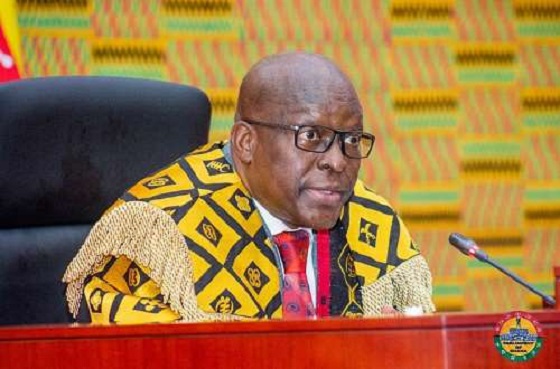

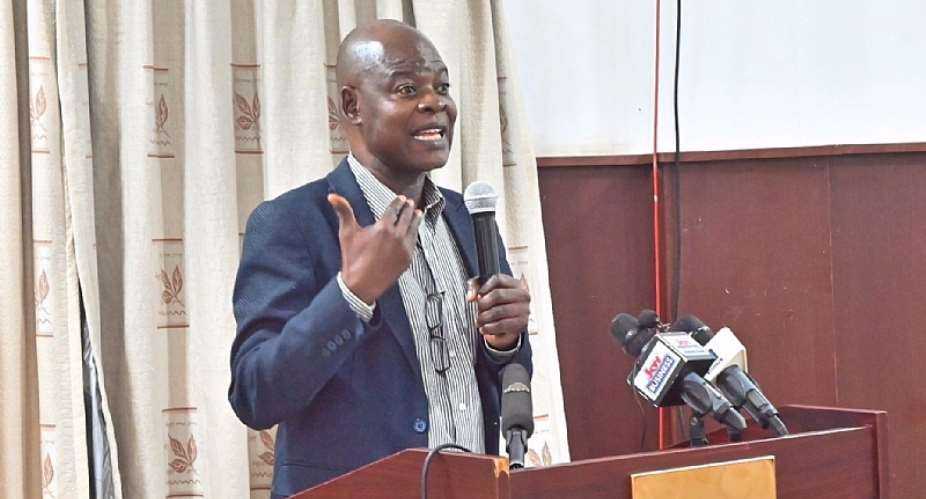










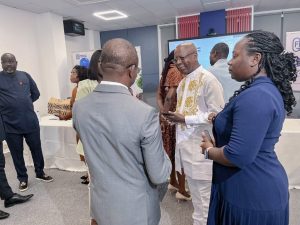

Facebook
Twitter
Pinterest
Instagram
Google+
YouTube
LinkedIn
RSS